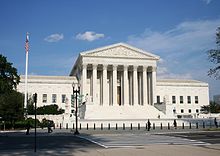 The most important decision issued by the U. S. Supreme Court this year was not its decision on President Obama’s healthcare legislation, important as that issue is for the future of America. The most significant ruling in my opinion was given in the Hosanna-Tabor case. This case was heard by the Court last October and the verdict given in January of this year (2012). I have a printed copy which can easily be found online.
The most important decision issued by the U. S. Supreme Court this year was not its decision on President Obama’s healthcare legislation, important as that issue is for the future of America. The most significant ruling in my opinion was given in the Hosanna-Tabor case. This case was heard by the Court last October and the verdict given in January of this year (2012). I have a printed copy which can easily be found online.
This case involved the dismissal of a called minister of a local Lutheran congregation. The issue started with some disability questions involving the minister and Christian school teacher. Eventually, the church had to give the position to another person in order for the ministry to be carried out. When the original minister wanted to come back and pursue the position again, the church refused — a course had been set. The minister challenged the decision to let someone else continue in the position. The church told the minister to follow the appeal procedures used within the Lutheran Church’s hierarchy to handle disputes. The minister refused and instead sued the Church. The Hosanna-Tabor congregation viewed this unwillingness to follow the procedures for handling disputes as insubordination and rescinded the call of this minister. The case went all the way to the Supreme Court.
In a stunning 9-0 decision, a unanimous Court dismissed the lawsuit. Churches under the First Amendment, the Court said, have the right to choose and dismiss their own ministers for whatever reason. The government should not intrude. This is part of religious liberty. This is the first time in American history that this specific conclusion has been drawn so tightly and so clearly. It is surprising to see such a forceful and lucid decision in a day when government encroachment into the details of American lives is a growing, daily burden. Most of the decisions regarding religious liberty have been about individual liberty to worship, etc. Here the government is prevented from sticking the camel’s nose into the tent of religious organizations. The potential ramifications are huge. This may head off the move to force churches to hire those who disagree with the lifestyle they teach. It is an interesting decision in light of the present Administration’s efforts to force religous employers (the issue is primarly Roman Catholics) to pay for health care to cover things contrary to what the Church believes such as contraception. The decision does not allow church leaders to be free from criminal prosecution when they violate the law (think priests who have molested children). The issue is freedom of churches to choose their own leaders. Churches do not choose the political leaders of the land. Political leaders should have no say in determining who leads in our churches.
